Summer SURF 2024 Team Project Descriptions
The faculty invited to serve as mentors for the 2024 SURF program represent a broad cross-section of academic disciplines at the University, and they represent a wide variety of paths that individuals take to pursue careers as faculty with research interests.
When submitting the application, students should address their interest in the specific project and how their qualities and experiences can aid the faculty in their research. Students may want to contact the specific faculty mentor to get acquainted with the faculty and to discuss their interests and project.
You can find an application link for each project at the end of their project descriptions listed below.
SURF Faculty Bios and Research Projects (2024)
The following faculty have been invited to mentor students in the summer 2024 SURF program.
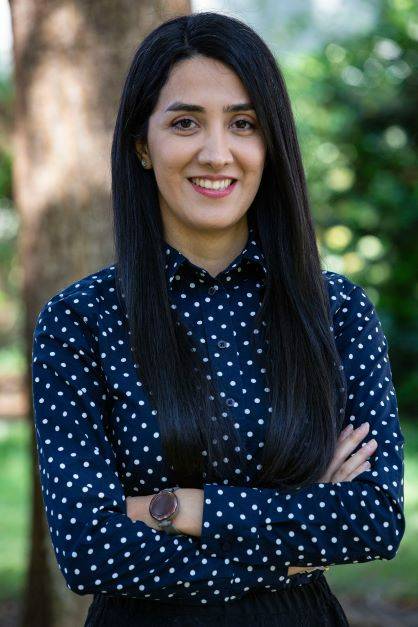
Dr. Bahareh Abbasi is an Assistant Professor in the Dept. of Computer Science – Mechatronics Engineering program at California State University Channels Islands (CSUCI). She received her Ph.D. in Electrical and Computer Engineering from University of Illinois at Chicago in 2019. Her research interests include robotics, machine learning and deep learning, Virtual Reality (VR), assistive technologies, and human–robot interaction for service robots that can assist humans at home or in the factory.
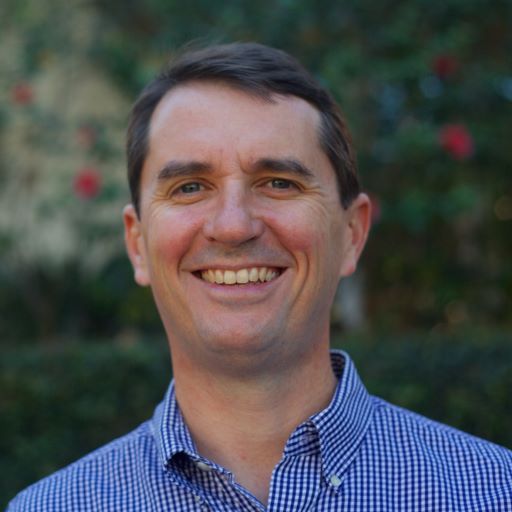
Dr. Jason T. Isaacs is currently an associate professor of Computer Science at California State University, Channel Islands. Dr. Isaacs received a Ph.D. degree in electrical and computer engineering from the University of California, Santa Barbara, CA, USA, in 2012 under the supervision of Professor João Hespanha.
He received a B.S. degree in electrical engineering from the University of Kentucky in 1999. Upon graduation, he spent the next six years working as a motion control development engineer for Lexmark International Incorporated. Upon completion of his Ph.D. in March 2012, he continued at UCSB as a postdoctoral scholar where he led a three-year applied research project sponsored through the Institute for Collaborative Biotechnologies. He spent a summer as a research intern in the Sensor Fusion group at the U.S. Army Research Laboratory in 2008 and spent two summers as an Office of Naval Research Faculty Research Fellow with the NSWC Port Hueneme Division in 2020 and 2022.
Project Title and Description - "Sawyer in Virtual Reality: Robotic Control for Object Manipulation"
Despite significant advancements in robotics, achieving complete autonomy for robots in various domains, such as healthcare and manufacturing, remains a challenge. In situations with highly variable and unstructured environments, like hospitals and factories, teleoperation emerges as a practical alternative solution. This approach aims to empower robots to perform complex tasks remotely with human intervention and focuses on developing a framework that combines human intelligence and expertise with robots capabilities. Specifically, this is crucial for tasks like remote object manipulation, exemplified in scenarios such as surgical robots or service robots on the factory floor, or even space robots where direct human operation is impractical. In this SURF project, students will explore how to empower a robotic arm to execute object manipulation tasks directed by a human in a virtual reality (VR) or Augmented Reality (AR) experience. The project involves an extensive literature review to comprehensively understand the challenges associated with this endeavor and explore existing teleoperation methods. Using the Sawyer robot and the Robot Operating System (ROS), students will develop the necessary robotic and VR/AR-related modules. Students will investigate innovative approaches to seamlessly blend the virtual and real-world elements, ensuring that the robot responds effectively to human directives within the immersive context provided by VR or AR experiences. This initiative provides hands-on and practical learning experiences for undergraduates interested in working with robotic arms like Sawyer robot and their simulator, and VR/AR related technologies. The project is designed to introduce computer science and robotics/mechatronics engineering students to an interdisciplinary research environment, enabling them to acquire skills that extend beyond traditional classroom education. Required Items: There is a potential need for the purchase of a gaming laptop and a VR headset, specifically the HTC VIVE 2. Our Gaming Lab (currently located in Solano Hall) is equipped with Meta Quest 2 VR headsets and gaming PCs. While we may explore the possibility of obtaining access to these resources for the SURF project, it is imperative that SURF students conduct thorough research to determine whether the HTC VIVE 2 VR headset and a new gaming laptop are essential for the successful execution of the project.
Click here to apply for their project!
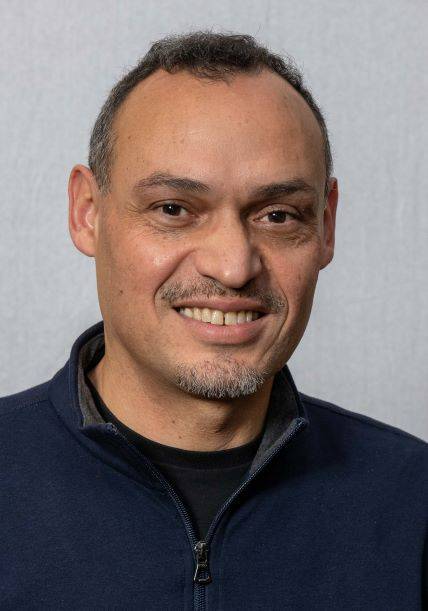
Dr. Ahmed Awad is an Associate Professor of Chemistry at CSUCI. He received his Ph.D. in Bioorganic Chemistry from University of Ulm in Germany, and did his postdoctoral research at Iowa State and UC Santa Barbara. His research interest is in design and development of novel therapeutics for treatment of cancer and infectious diseases. He focuses on nucleoside analogues and nucleic acids chemistry to develop novel therapeutics.
Project Title and Description - "Synthesis and biological evaluation of novel nucleoside analogues as therapeutics for pancreatic cancer"
Pancreas is a gland in the digestive system produces enzymes that regulate blood sugar. In pancreatic cancer, uncontrolled cell growth begins in parts of the pancreas which develop tumors that interfere with its function. Pancreatic cancer is difficult to detect in its early stages, and it spreads rapidly to nearby organs such as liver. In the US over 50,000 new cases of pancreatic cancer are reported annually making it the 3rd most common cause of cancer deaths. Symptoms includes loss of appetite, weight loss, pain in the upper abdomen and in the back, fatigue and depression. Treatments include surgery, chemotherapy, and radiation, with a mean survival rate of approximately six months. Drug resistance, and overall aggressive biology are major challenges in the treatment. Nucleosides are the building blocks of the nucleic acids, RNA and DNA. Current standard chemotherapy treatments for pancreatic cancer is gemcitabine, a nucleoside analogue that has been approved by FDA in 1997. However, its effectiveness is far from satisfactory due to cellular mechanisms limiting its transport, activation, and overall efficacy. The survival rate at 12 months was 18% for gemcitabine patients. Therefore, development of novel therapeutics for pancreatic cancer is crucial. In this proposed SURF project, students will design and develop novel nucleoside analogues and investigate their efficacy for treatment of pancreatic cancer. The project plans are designed considering the possibility of carrying out some of the work in a virtual environment. The first part involves computational studies to design and optimize the proposed chemical structures. The results will be analyzed to examine the binding affinity of the proposed molecules to important enzymatic targets in pancreatic cancer. The toxicity properties will be also computationally evaluated. A widely used computational biology software that is available for CSUCI students, through accessing CSUCI Virtual Labs, will be utilized for these studies. The participating SURFers will perform literature survey on the development of such therapeutics, perform the computational studies and analyze their data, and will develop an effective and convenient methods to synthesize the developed molecules. The faculty member will introduce the synthetic methods, and will propose alternative solutions for possible problems. With the guidance’s of the faculty research mentor, students will collect reported protocols and will develop their synthetic schemes. Students proposals will be discussed before an efficient synthetic route is recommended. In the in-person lab work, after intensive training provided by the faculty, students and the faculty will work on their synthetic protocols, purify the products by column chromatography, characterize new compounds by spectroscopic techniques (Mass, IR, and NMR), and analyze their data for the final conclusion. These compounds may be submitted to the National Cancer Institute for screening in their cancer cell line assay system.
Click here to apply to Dr. Awad's project!
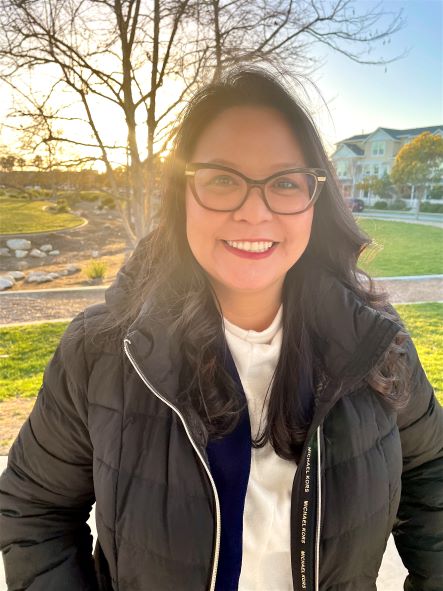
As an environmental microbiologist, Dr. Becerra has worked on environmentally related projects like determining the bioavailability, fate and transport of metal contaminants in tidal systems, the natural attenuation of acid mine drainage, and changing soil carbon storage due to global climate change. Currently, her research group is interested in microbially-induced corrosion of metals, microbial decomposition of dead plant roots, and the antibacterial effects of Chumash medicinal plants.
Project Title and Description - "Investigating the Antibacterial Potential of Chumash Medicinal Plants"
Antibiotics are drugs used to treat bacterial infections. However, bacteria have evolved the ability to overcome or resist the drugs meant to kill them. As a result, antibiotic resistance has become a global threat. Therefore, discovering new antibiotics is one strategy to mitigate antibiotic resistance. Some scientists are searching for new antibiotics in extreme environments or synthesizing them in the lab. Our approach is to investigate medicinal plants used in traditional practices as potential sources of antibiotics. For hundreds of years, traditional systems of medicine have used plants for their diverse array of naturally occurring and structurally diverse antimicrobial phytochemicals to treat infections. Certain herbal medicines are especially clinically valuable because the bioactive compounds found in plant roots, leaves, stem barks, and flowers are known to treat infection without leading to resistance. Today, many still ascribe to complementary and alternative medicine such as Curanderismo in addition to allopathic medicine. Recognizing that CSUCI is on Chumash land and that the Chumash have a rich history of using native California plants for various medical treatments, the goal of this research study is to determine the antibacterial effect of Chumash medicinal plants. The following research objectives are to 1) test plant extracts on medically relevant bacterial species, and 2) characterizing a suite of phytochemicals. Time permitting, additional objectives are to 3) determine the minimum inhibitory and bacteriocidal concentrations for these plant extracts and 4) screen additional Chumash medicinal plants. RESEARCH APPROACH 1) Preliminary work screening 18 Chumash medicinal plants for antibacterial effect was performed by undergraduate researchers. They tested plant extracts in various solvents on three bacterial cultures: Escherichia coli, Bacillus subtilis, and Pseudomonas fluorescens. SURF 2024 students will continue the project testing these plant extracts on additional bacterial species of medical importance such as Staphylococcus aureus and Streptococcus pyrogenes using the Kirby-Bauer disk diffusion method. They will also determine whether the effect of the plant extract and phytochemicals are bacteriocidal (kills bacteria) or bacteriostatic (inhibits growth/does not kill). 2) The plant extracts have specific phytochemicals. Therefore, the second objective is to investigate the phytochemicals. First, the students will screen for the presence of a suite of phytochemicals such as phenols, tannins, and flavonoids using colorimetric assays. Then, they will quantify these phytochemicals using other analytical methods such as gas chromatography or liquid chromatography. 3) Students will determine what the minimum inhibitory and bacteriocidal concentrations are for these plant extracts to have an effect on these bacterial cultures. 4) Students will collect plants in an ethical and culturally-informed way, dry the plants, and produce extracts in ethanol. 18 Chumash medicinal plants have been screened so far. We aim to investigate more plants and additional extraction methods.
Click here to apply to Dr. Becerra's project!
 Dr. Aura Pérez-González is an Assistant Professor of Early Childhood Studies at California State University Channel Islands (CSUCI). She earned her Ed.D. in Curriculum and Teaching with a focus on Early Childhood Education from Teachers College, Columbia University. Dr. Pérez-González’s research focuses on critical early childhood literacies and how literacy can foster children’s sense of justice, equity, diversity, and inclusion (JEDI).
Dr. Aura Pérez-González is an Assistant Professor of Early Childhood Studies at California State University Channel Islands (CSUCI). She earned her Ed.D. in Curriculum and Teaching with a focus on Early Childhood Education from Teachers College, Columbia University. Dr. Pérez-González’s research focuses on critical early childhood literacies and how literacy can foster children’s sense of justice, equity, diversity, and inclusion (JEDI).
Project Title and Description - "Analyzing Children’s Picture Books for Themes of Justice, Equity, Diversity, and Inclusion (JEDI)."
Ladson-Billings (1992) once argued, “the literacy message in the United States is decidedly apolitical while at the same time advancing a political agenda that helps maintain the status quo” (p. 381). Accordingly, children’s picture books are often misconstrued by early educators to be neutral and apolitical curriculum choices that are meant to only support young children to read, write, speak, and listen. Literacy is often misunderstood to mean only reading and writing symbols; however, literacy can mean reading words and reading worlds (Freire & Macedo, 1987; Souto-Manning, & Yoon, 2018). As Ladson-Billings asserted, there is no such thing as literary neutrality. All books can leave a lasting impression on young children because they are beginning to learn and form opinions about themselves, people unlike themselves, and about societal themes pertaining to justice, equity, diversity, and inclusion (JEDI) (Adichie, 2009; Tschida, Ryan, & Ticknor, 2014; Spencer, 2022). In this SURF project, we will therefore conduct a qualitative research study which will entail a content analysis of the past Pura Belpré Award winning children’s picture books (from 1996 to 2023) for themes pertaining to justice, equity, diversity, and inclusion (JEDI). The Pura Belpré Award is granted to outstanding works of literature for children and young adults that best portray, affirm, and celebrate the Latino cultural experience. For this SURF project, student researchers will first meet with Dr. Perez-Gonzalez to discuss which aspect of JEDI they feel they are most knowledge about and interested in further exploring. Dr. Perez-Gonzalez will then work with each research student to explain the timeline of the research project, expectations of each research student, and steps of each phase of the project. All members of the SURF project will be expected to read 3-4 children’s books per week to keep pace with the timeline of the research project. Alongside Dr. Perez-Gonzalez, all student researchers will then read, thematically code, and analyze each award-winning children’s picture book’s story line, languages used, illustrations, characters identities, and author/illustrators background and identities and their connection to JEDI issues. To allow for greater accessibility, this SURF project will be primarily conducted online through asynchronous work and synchronous Zoom sessions. However, if we will also aim to schedule in person meetings depending on everyone’s schedule and flexibility. The projected timeline of this SURF project is 8 weeks.
Click here to apply to Dr. Perez-Gonzalez's project!
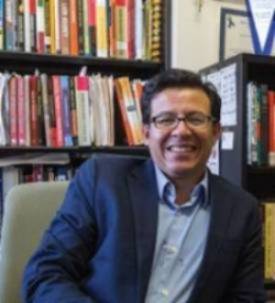 Dr. José M. Alamillo is currently Professor of Chicana/o Studies at California State University Channel Islands (CSUCI). He received his Ph.D. in Comparative Cultures from University of California, Irvine. Dr. Alamillo is an expert on Mexican American cultural history with a focus on labor, immigration, gender, leisure, and sports. He is currently working on two research projects: (1)“Dark Waters: Floods, Ethnic Mexicans and the Politics of Disaster Relief along the U.S.-Mexico Borderlands.” This book will examine the relationship between disaster relief organizations and ethnic Mexican communities in the aftermath of flood disasters in southern California, Arizona, Colorado and Texas. (2) “Untold Legacies: Re-Interpreting Ventura County History through an Ethnic Studies Lens.” This edited book will bring together scholarly essays, testimonios, and creative expressions that center that center subjugated histories and knowledges of racially minoritized communities in Ventura County.
Dr. José M. Alamillo is currently Professor of Chicana/o Studies at California State University Channel Islands (CSUCI). He received his Ph.D. in Comparative Cultures from University of California, Irvine. Dr. Alamillo is an expert on Mexican American cultural history with a focus on labor, immigration, gender, leisure, and sports. He is currently working on two research projects: (1)“Dark Waters: Floods, Ethnic Mexicans and the Politics of Disaster Relief along the U.S.-Mexico Borderlands.” This book will examine the relationship between disaster relief organizations and ethnic Mexican communities in the aftermath of flood disasters in southern California, Arizona, Colorado and Texas. (2) “Untold Legacies: Re-Interpreting Ventura County History through an Ethnic Studies Lens.” This edited book will bring together scholarly essays, testimonios, and creative expressions that center that center subjugated histories and knowledges of racially minoritized communities in Ventura County.
Project Title and Description - "Untold Legacies: A Ventura County Ethnic Studies Reader"
The project is to conduct research for an edited book, Untold Legacies, that centers the experiences of Native American and Indigenous, African Americans, Asian American Pacific Islanders, Chicano/as and Latino/as in Ventura County. For too long, Ventura County local histories have promoted a romanticized white pioneer narrative and idealistic vision of the past. To counter this sanitized history, students will learn how to conduct research, write, present, and publish in the interdisciplinary field of Ethnic Studies. The specific roles for student researchers include: reviewing the published literature on Ventura County’s ethnic groups, proposing a new chapter based on a list of researchable topics, conduct research collectively on a proposed chapter, present research findings at a conference audience, write collectively a chapter for submission in Untold Legacies, review submission abstracts to edited volume and provide feedback to editor, review and provide feedback to editor on book proposal, and to provide feedback to editor on book introduction. The recent 2020 census revealed that Ventura County’s population has become increasingly more diverse and with ethnic studies becoming a requirement in high schools, community colleges, and CSU campuses, we need more published stories with an ethnic studies lens. It is critical that a more accurate account of Ventura County’s multiethnic past takes place inside the classroom by highlighting the counter narratives of people of color. This edited book can be adopted for introductory courses in Ethnic Studies at high schools, community colleges and universities.
Click here to apply to Dr. Alamillo's project!
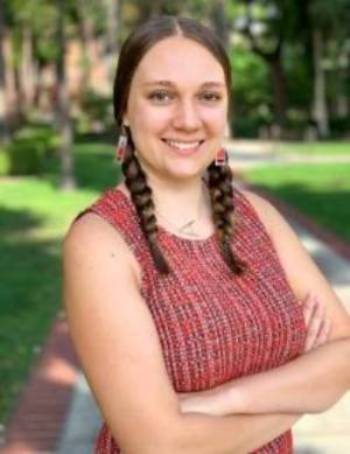 Dr. Ariel Vaughn is an Assistant Professor of Chemistry at CSUCI. She earned her Ph.D. in Chemistry at the University of Southern California. Her research is focused on making chemistry, and science as a whole, more inclusive. As an Indigenous woman from a rural community, this passion hits close to home. The Vaughn Lab focuses on designing homework assignments that help students understand why chemistry matters to their lives and see themselves as scientists. Dr. Vaughn strongly believes in building community in the classroom and in her research group.
Dr. Ariel Vaughn is an Assistant Professor of Chemistry at CSUCI. She earned her Ph.D. in Chemistry at the University of Southern California. Her research is focused on making chemistry, and science as a whole, more inclusive. As an Indigenous woman from a rural community, this passion hits close to home. The Vaughn Lab focuses on designing homework assignments that help students understand why chemistry matters to their lives and see themselves as scientists. Dr. Vaughn strongly believes in building community in the classroom and in her research group.
Project Title and Description - "Analyzing Students’ Perceptions of Chemistry in the World Around Them Through Weekly Homework Assignments"
There is a known disconnect between real-world political, economic, and social issues and the topics taught in secondary and higher education science classrooms. This is a major concern of contemporary science education as a whole but is particularly relevant to chemistry education. We want students to understand the everyday applications of the science we are teaching in the classrooms, however the education provided at the university-level tends to be more focused on skills training, content coverage, and exam preparation. In the last two decades, there has been a shift in the chemical education literature and practice towards emphasizing the connections between science in the classroom and everyday life. While there have been a wide variety of innovative approaches to teaching completed in this time, the vast majority of these approaches require a complete overhaul of the chemistry curriculum, putting a large burden on faculty and requiring institutional level support. The Vaughn Lab focuses on designing homework assignments that can be employed at a variety of levels and institutions aimed at bridging this disconnect. In this SURF project, researchers will analyze the responses from one of the homework assignments helping students identify chemistry in the world around them. Each week, students were asked “How have you observed chemistry outside of class this week?” Student responses to such a simple question are wide-ranging and rich. The responses can be analyzed for the types of examples, scientific language usage, how the material relates to the course material, and more. Researchers in the laboratory will, alongside the faculty member, explore the different categories and learn how to categorize data quantitatively and qualitatively. SURFers will undergo extensive NVivo 14 training, learning the necessary coding skills to analyze the student responses. To help remove any coding biases, multiple researchers will independently code the same data categories for comparison. The faculty mentor will facilitate comparison meetings to ensure that researchers agree on the coding categorizations. With the guidance of the faculty research mentor, SURFers will learn how to graphically represent this data and communicate their findings within the research group and beyond. In addition to sharing their research in regular group meetings, group meetings will be a time for SURFers to learn new skills, for example how to write abstracts. Researchers will be encouraged to apply to conferences including the SACNAS National Diversity in STEM Conference. A more complete analysis of the data is likely to go beyond the summer and into the Fall 2024 semester. Ideal SURF students will have interest in participating in the publication process for this data, anticipated to begin in Fall 2024. Outstanding SURFers interested in continuing research with the Vaughn Lab will be nominated for research and scholarship awards.
Click here to apply to Dr. Vaughn's project!
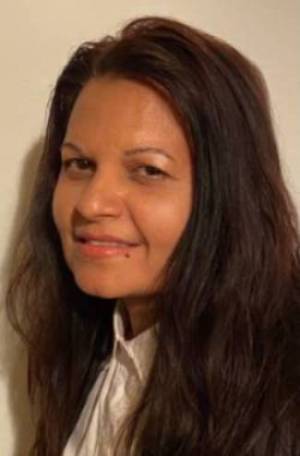 Dr. Neomie Congello is an Assistant Professor in the Nursing Department at CSU Channel Islands and has taught Introduction to Professional Nursing Practice, Nursing Research; and Evidence-Based Practice and Quality Improvement over the last several years. Dr. Congello is a graduate of UCLA where she received her PhD in Nursing in 2015. Her current research focuses on innovative clinical learning and clinical teaching to adequately prepare students for an easier transition into professional nursing practice.
Dr. Neomie Congello is an Assistant Professor in the Nursing Department at CSU Channel Islands and has taught Introduction to Professional Nursing Practice, Nursing Research; and Evidence-Based Practice and Quality Improvement over the last several years. Dr. Congello is a graduate of UCLA where she received her PhD in Nursing in 2015. Her current research focuses on innovative clinical learning and clinical teaching to adequately prepare students for an easier transition into professional nursing practice.
Project Title and Description -"Levels of Self-Efficacy in the Dedicated Education Unit"
Nursing competence is crucial given the current high complexity of care needed for an aging patient population combined with an increasing nursing shortage. The Dedicated Education Unit (DEU) clinical model provides a solution to adequately equip students for entry into practice through one-to-one clinical rotations with staff nurses in the clinical teacher role. Although research has shown a high level of student satisfaction found with DEU clinical experiences, other measures of outcomes are needed for continued evaluation of the model. Self-efficacy has been shown to lead to higher performance that could potentially lead to an easier transition for nursing students into professional practice. The purpose of the study is to examine self-efficacy in three cohorts of students based on their traditional and DEU clinical experiences in the nursing program. A quasi-experimental cross-sectional study will be conducted with nursing students currently enrolled in a medical-surgical clinical course. A convenience sample that includes a combined total of approximately 146 sophomore, junior, and senior students will be interviewed at the end of fall 2024 and spring 2025 semesters. Upon receiving approval from the institutional review board and informed consent from students, the adapted 10-item Generalized Self-Efficacy Scale will be available online for students to complete anonymously. Students will be asked to complete the survey before and after the end of their clinical rotation for the semester. Data will be collected on the total number of DEU and traditional clinical rotations students have had in the program. The Statistical Package for Social Science will be used to calculate frequencies and descriptive statistics of self-efficacy levels of students who have had DEU and traditional clinical rotations in the hospital. Next, independent-sample t-tests will be used to calculate and compare the pre-and post-composite scores for students in both types of clinical rotation. Finally, a paired t-test will be used to examine pre-and post-clinical self-efficacy among students in the DEU clinical group. Expectations are that the focus on self-efficacy levels for clinical performance may provide insights for a more beneficial approach for the DEU clinical in nursing programs and in preparing students for competent nursing care. Role of Student Researchers in the Summer SURF Program Students will be given opportunity to participate in the following with faculty guidance: (1) Conducting and creating a literature review table (2) Writing the literature review for the research study (3) Completing the IRB application (4) Designing a poster of the study proposal Full completion of the four opportunities mentioned above will be based on the research abilities of the student researchers and progress made during the Summer SURFer program.
Click here to apply to Dr. Congello's project!
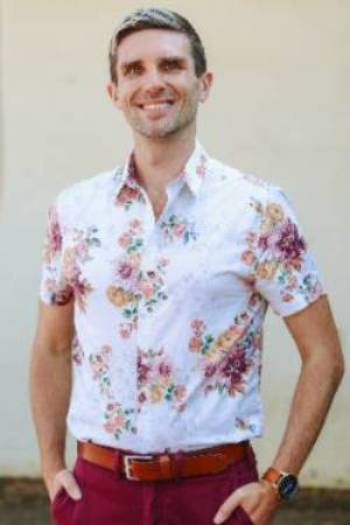 Dr. Ronald W. Berkowsky is an Assistant Professor in the Health Science Program at CSUCI. His recent scholarship has employed a community-engaged approach (featuring partnerships with Ventura County-based agencies and nonprofits) to identify and address local healthcare-based elder concerns, including investigating issues surrounding LGBTQIA+ healthcare through the life course. He is committed to scholarship, teaching, and service that promotes age-inclusiveness, utilizes an elder justice framework, and addresses the needs of an increasingly diversifying elder population.
Dr. Ronald W. Berkowsky is an Assistant Professor in the Health Science Program at CSUCI. His recent scholarship has employed a community-engaged approach (featuring partnerships with Ventura County-based agencies and nonprofits) to identify and address local healthcare-based elder concerns, including investigating issues surrounding LGBTQIA+ healthcare through the life course. He is committed to scholarship, teaching, and service that promotes age-inclusiveness, utilizes an elder justice framework, and addresses the needs of an increasingly diversifying elder population.
Project Title and Description -"Identifying and Evaluating Service Needs among LGBTQIA+ Older Adults in Ventura County"
LGBTQIA+ older adults are at risk for experiencing significant disparities in physical and mental health outcomes including (but not limited to) higher rates of disability, poorer physical health, higher rates of depressive symptoms, higher engagement with risky health behaviors (e.g., smoking, excessive alcohol consumption), and increased prevalence of HIV/AIDS. These disparities are due in part to experiences of stigmatization and discrimination through the life course which contribute to barriers in accessing formal healthcare services and informal care/support (e.g., family caregiving). Stigmatization and discrimination through the life course also contribute to fewer employment opportunities, financial instability, and legal issues which prevent LGBTQIA+ older adults from readily accessing programs and services traditionally designed to support aging adults. To this end, a number of national, state, and local agencies and nonprofits have focused efforts on identifying and addressing the particular needs of LGBTQIA+ older adults; however, organizations dedicated to LGBTQIA+ elder needs often lack the capacity (e.g., lack of funding, lack of trained personnel, lack of dedicated time) to conduct research necessary to adequately identify the needs of LGBTQIA+ in their communities. Scholars emphasize that LGBTQIA+ disparities and barriers to care may be contingent on regional and cultural characteristics, and it us thus important for these organizations to be able to collect data at the local level to elucidate issues in their respective regions. This project will utilize a community-engaged approach to identify and evaluate service needs of LGBTQIA+ older adults in Ventura County. In partnership with the LGBT+ Aging Coalition of Ventura County (an official volunteer program of the Ventura County Area Agency on Aging, or VCAAA), a series of focus groups will be conducted with LGBTQIA+ elder residents in the county to identify areas wherein residents feel elder services are lacking, are not adequately addressing the needs of LGBTQIA+ older adults, and/or should be prioritized for targeted improvement. Student researchers will work closely with representatives from the LGBT+ Aging Coalition (including older LGBTQIA+ residents, service providers, and community allies) and with Dr. Berkowsky in recruiting Ventura County-based LGBTQIA+ older adults and conducting focus groups to elucidate areas where elder services can be improved. Topics for the focus groups will be pre-determined in consultation with the LGBT+ Aging Coalition to allow students to focus their efforts on focus group organization and execution as well as on data collection and analysis. At the conclusion of the project, students will draft a summary report to be presented to the LGBT+ Aging Coalition which details the focus group findings and provides recommendations on implementing/improving elder services in the region based on community feedback. Should participating students wish to continue working on the project beyond the Summer SURF program, it is possible the summary report can be submitted for inclusion at a scholarly conference and/or revised for submission to a scholarly publication. This project is best suited for students looking for introductory experience in conducting community-engaged research, organizing and conducting focus group investigations, analyzing qualitative data, and reporting qualitative results in community settings. Students with a background or interest in health/human services, aging/gerontology, and/or LGBTQIA+ issues are encouraged to apply (although expertise in these areas is not required). Note that because there is an expectation that focus groups will be conducted in community settings most convenient for LGBTQIA+ participants, students who participate in this project may need to travel to different county sites.
Click here to apply to Dr. Berkowsky's project!
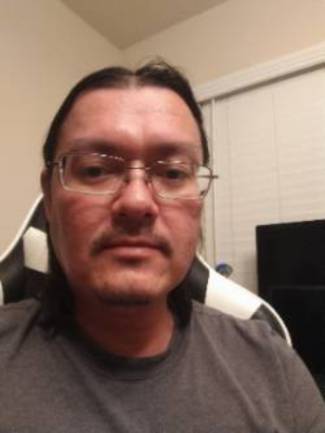 Dr. William Munroe is a faculty member in the Chemistry Department at CSUCI. He received his Ph.D. in Biochemistry and performed his postdoctoral research at the University of California, Los Angeles. His research interests involve studying small molecule-protein and protein-protein interactions. He is currently focusing on studying senolytic compounds.
Dr. William Munroe is a faculty member in the Chemistry Department at CSUCI. He received his Ph.D. in Biochemistry and performed his postdoctoral research at the University of California, Los Angeles. His research interests involve studying small molecule-protein and protein-protein interactions. He is currently focusing on studying senolytic compounds.
Project Title and Description -"Evaluating senolytic drugs using a planarian model system"
This project aims to utilize a planaria (flatworm) model system to study senolytic agents and how they affect senescent cells. Senescent cells are cells which have reached the end of their replicative lifespan. However, these cells do not die, but rather enter a condition known as senescence. These senescent cells remain metabolically active. During aging, senescent cell accumulate in the body and are thought to be a contributor to aging. Senolytics are a class of drugs that target senescent cells and clear them from the body. Different members of this class of drugs elicit this effect by acting upon different protein pathways. Planaria are a unique model system due to the presence of large amounts of stem cells. This allows for an incredible regeneration capacity of an individual animal. This organism is routinely used as a model system for studying tissue regeneration &/or stem cells due to the persistent maintenance of this cell type in the organism. Student workers will grow the planaria, prepare the planaria samples that will be subjected to whole cell proteomics, as well as perform data analysis. This is a mass spectrometry method to globally quantitate the amount of and identities of proteins in a cell homogenate sample. This method will be used to identify protein changes which occur during treatment.
Click here to apply to Dr. Munroe's project!
 Dr. Thomas Clobes spent over 20 years in the pharmaceutical and medical device industries, bringing relevant real-world experience to the classroom. He is a recipient of the Dean's Excellence Award for Teaching. His research focuses on the intersection of health policy, patient access, and medical cannabis. Dr. Clobes is passionate about including students in his research, co-authoring multiple studies with students.
Dr. Thomas Clobes spent over 20 years in the pharmaceutical and medical device industries, bringing relevant real-world experience to the classroom. He is a recipient of the Dean's Excellence Award for Teaching. His research focuses on the intersection of health policy, patient access, and medical cannabis. Dr. Clobes is passionate about including students in his research, co-authoring multiple studies with students.While medical cannabis has become increasingly accepted by mainstream medicine, significant challenges for patients seeking cannabinoid therapy remain. With the varying legal status of the plan throughout the United States, patients experiences can differ significantly based on their state of residence. In certain states, simply obtaining cannabis products is difficult. In some other states, patients can obtain the cannabis products they need but experience stigma from family and friends. Even in states with full legal access to cannabis, however, such as California, patients can be overwhelmed by the number of products available in their local dispensary and the unfamiliar terminology used to describe cannabis products. Regardless of where one lives, any of these factors can potentially contribute to poor patient outcomes for those seeking relief of their ailments through the use of medical cannabis. This project seeks to understand medical cannabis patients’ behaviors and experiences obtaining and using cannabis, the challenges and barriers medical cannabis patients experience, amount of relief from treated ailments, and side effects experienced. Survey data has already been collected from over 1,000 medical cannabis patients across the country regarding ailments treated, quantities of cannabis used, cannabinoid content of products used, barriers and challenges experienced, and processes/locations cannabis users access the product. Unlike conventional pharmaceuticals, medical cannabis requires an individualized approach. The process of finding the correct cannabis product, combined with titration and the need for the patient to learn how to listen to their body’s cues to achieve an optimal dose, can be challenging. Therefore, for the SURF program, students will analyze the data comparing the usage of cannabis between patients who are under the supervision of a physician to those who are managing their cannabinoid therapy on their own. Specifically, the team will compare perceived effectiveness, quantities of THC/CBD, frequency of use, challenges and barriers experienced, and side effects between the two groups. Student researchers will be guided throughout the data analysis and given opportunities to provide feedback on how the project can be improved. In addition to the data analysis, students will prepare the data for dissemination. Students will be mentored through preparing research posters for presentations at scientific conferences – and will be invited to present the data with Dr. Clobes. Additionally, students will begin working on a manuscript for publication, including identifying an appropriate journal, preparing a literature, and composing the methods, results, and discussion.
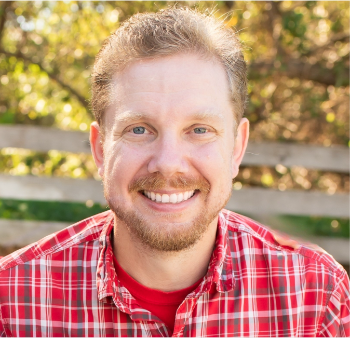 Dr. Geoff Dilly (Biology) is a marine ecophysiologist and an Associate Professor at Cal State University Channel Islands. His research interests and expertise focus on organismal and ecological effects created by natural and anthropogenic stressors including thermal challenges, desiccation, acidification and microplastics. He has published, presented and received grant funding on topics of thermal tolerance, transcriptomics, proteomics, oxidative stress, ecological monitoring, and more. He also teaches a variety of courses including Marine Biology, Deep-Sea Biology, Animal Physiology, Bioinformatics, and a senior capstone entitled “Sea Change: Oceans of the 21st Century”.
Dr. Geoff Dilly (Biology) is a marine ecophysiologist and an Associate Professor at Cal State University Channel Islands. His research interests and expertise focus on organismal and ecological effects created by natural and anthropogenic stressors including thermal challenges, desiccation, acidification and microplastics. He has published, presented and received grant funding on topics of thermal tolerance, transcriptomics, proteomics, oxidative stress, ecological monitoring, and more. He also teaches a variety of courses including Marine Biology, Deep-Sea Biology, Animal Physiology, Bioinformatics, and a senior capstone entitled “Sea Change: Oceans of the 21st Century”. 